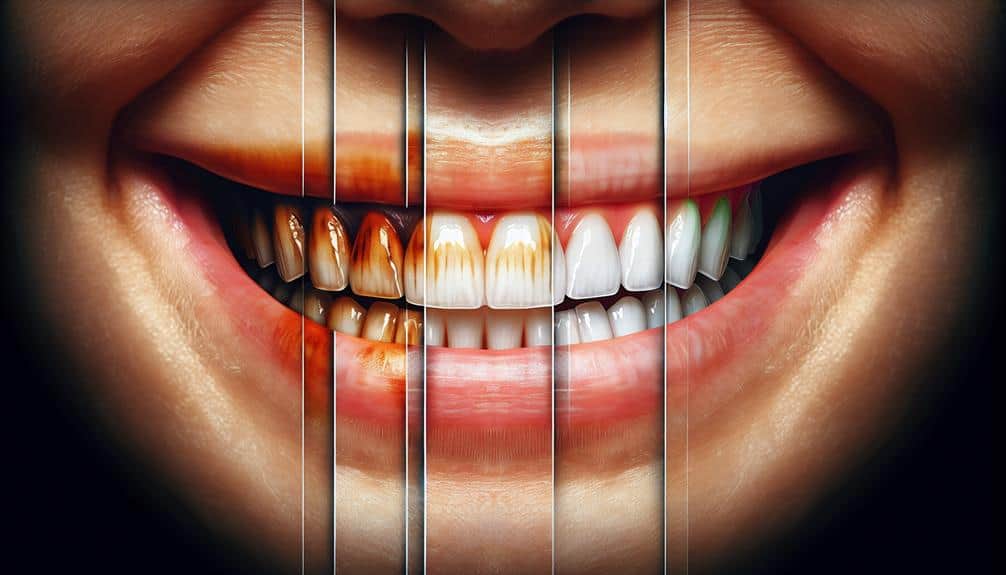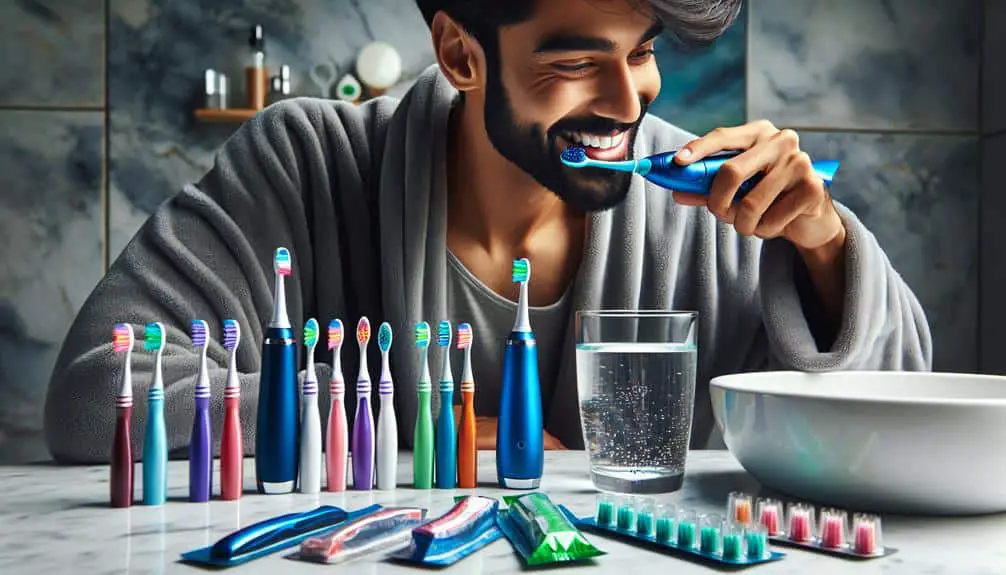As time passes, the brilliance of your teeth whitening diminishes due to natural wear and tear, external staining from foods and habits such as smoking, and the effects of aging and medications. Protecting your whitened teeth involves understanding these factors and how they impact the longevity of your results. Maintaining good oral hygiene, seeking professional advice, and being mindful of lifestyle choices can help sustain the effects of teeth whitening treatments. Understanding these underlying causes can assist you in preserving the whiteness of your smile.
Key Points
- Enamel erosion exposes yellow dentin, causing discoloration.
- Aging and external staining contribute to whitening fade.
- Neglecting oral hygiene leads to plaque buildup and yellowing.
- Medications like tetracycline can cause intrinsic stains.
- Regular dental cleanings and touch-up treatments maintain whitening effects.
Root Causes of Fading Whiteness
Why do teeth whitening results fade over time?
The fading of teeth whitening results can be attributed to various factors, including enamel erosion, aging, external staining, and medications. Enamel erosion, which naturally occurs with age, can expose the underlying dentin, leading to a yellowish appearance that may diminish the effects of teeth whitening treatments over time. As we age, the enamel on our teeth tends to wear down, making them more susceptible to discoloration and reducing the longevity of whitening effects.
Moreover, external staining from sources like coffee, tea, red wine, and tobacco can gradually tarnish the whiteness of your teeth, counteracting the results of whitening procedures. Additionally, certain medications such as tetracycline antibiotics can cause intrinsic stains that are challenging to eliminate through conventional whitening methods, contributing to the fading of whitening outcomes.
Understanding these root causes of fading whiteness can help you make informed decisions on how to maintain and prolong the effects of teeth whitening treatments.
Impact of Diet and Habits
The impact of diet and habits on teeth whitening results can be significant, affecting the longevity and effectiveness of whitening treatments. Here are three key ways in which your diet and lifestyle habits can impact the results of your teeth whitening efforts:
- Diet Impact: Consuming foods and beverages that are known to stain teeth, such as coffee, tea, red wine, and dark berries, can contribute to the fading of whitening results. These substances have chromogens that can attach to the enamel, causing discoloration over time.
- Lifestyle Habits: Habits like smoking or using tobacco products can lead to yellowing and discoloration of teeth. The chemicals in tobacco can penetrate the enamel, making it harder to maintain a bright white smile even after whitening treatments.
- Hygiene Practices: Neglecting proper oral hygiene, such as inconsistent brushing and flossing, can allow plaque and tartar to build upon the teeth, leading to a dull appearance. Regular dental cleanings and good oral care routines are essential to preserving whitening results.
Importance of Oral Hygiene
Maintaining proper oral hygiene practices is essential for preserving the results of teeth whitening treatments. Good oral care at home is vital in preventing stains from reappearing on your teeth. Brushing your teeth at least twice a day with a fluoride toothpaste and flossing daily helps remove plaque and prevent discoloration. Additionally, using a whitening toothpaste can help maintain the brightness of your smile between treatments.
Regular dental visits are also key to sustaining the effects of teeth whitening. Professional cleanings remove stubborn plaque and tartar buildup that can dull the whiteness of your teeth. During these visits, your dentist can assess your oral health and provide personalized advice on how to best care for your teeth at home.
Role of Professional Maintenance
To uphold the lasting effects of teeth whitening treatments, professional maintenance through regular dental visits plays an essential role in preserving the brightness of your smile. Here's why:
- Regular Checkups: Dentists can monitor the condition of your teeth and identify any early signs of staining or discoloration, allowing for prompt intervention to maintain the whitening effects.
- Customized Touch-Up Treatments: Through regular checkups, your dentist can recommend and provide touch-up treatments tailored to your specific needs, ensuring that your smile stays radiant for longer periods.
- Professional Guidance: Dentists offer expert advice on oral hygiene practices and lifestyle habits that can help prolong the results of teeth whitening. Their guidance can assist you in maintaining a bright smile between visits and enhance the effectiveness of any touch-up treatments recommended.
Tips for Prolonging Whitened Teeth
For the best longevity of your whitened teeth, incorporating proper oral care habits is essential in maintaining their brightness. After undergoing a teeth whitening procedure, it's important to follow certain guidelines to make sure your smile stays vibrant for as long as possible.
One effective tip is to schedule regular dental cleanings to remove surface stains and prevent yellowing. Additionally, practicing good oral hygiene at home by brushing your teeth twice a day and flossing daily can help maintain your whitened teeth.
To further prolong the effects of teeth whitening, consider using whitening toothpaste or mouthwash to help remove surface stains and prevent new ones from forming. Another helpful tip is to be mindful of consuming highly pigmented foods and beverages such as coffee, tea, and red wine, as they can stain your teeth over time.
Lastly, scheduling periodic whitening touch-ups with your dentist can help refresh the brightness of your smile. By combining these prevention techniques with regular dental visits, you can extend the lifespan of your whitened teeth and keep them looking their best.
Frequently Asked Questions
Can Teeth Whitening Cause Damage to the Enamel Over Time?
Teeth whitening can gradually affect enamel if not done properly. To safeguard enamel, follow dentist guidelines, avoid frequent whitening, and use enamel protection products. Maintain oral health with regular cleanings. Balance whitening for long-term effects.
Are There Certain Foods or Drinks That Can Help Maintain Whiter Teeth?
To maintain whiter teeth, you can bolster your dietary habits with crunchy fruits like apples and carrots that naturally cleanse teeth. Combining this with diligent oral hygiene and avoiding staining beverages can help prevent discoloration and maintain your bright smile.
How Often Should Professional Maintenance Treatments Be Done to Prevent Fading?
To maintain your bright smile, professional touch-ups are essential in preventing discoloration over time. Schedule regular maintenance treatments as advised by your dentist to keep your teeth looking their whitest and healthiest.
Can Genetics Play a Role in How Long Teeth Whitening Results Last?
Genetic factors can impact how long teeth whitening results last. Your lifestyle habits, like diet and oral hygiene, also play a vital role in the longevity of your whitening. Consistent care can help maintain a brighter smile.
Are There Any Natural Remedies or DIY Methods That Can Help Maintain Whiter Teeth Between Treatments?
To keep your pearly whites shining between treatments, try natural remedies like baking soda and DIY methods such as oil pulling. These options are effective and have long-term benefits for maintaining a bright smile.



